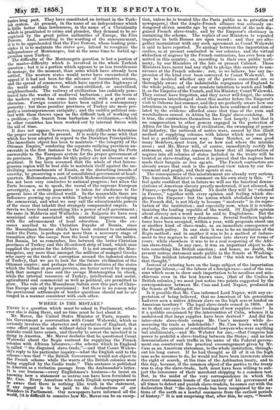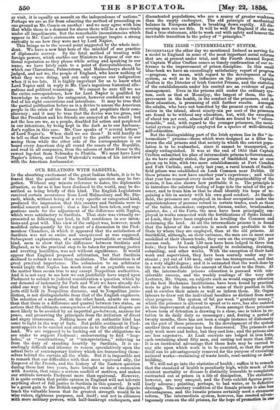WHERE IS THE MISTAKE?
Ticsin is a question which must be asked in Parliament, what- ever else is doing there, and no time must be lost about it.
Mr. Mayor, the United States Minister at 'Paris, reports to his Government a conversation with Count Walewski, which so seriously involves the character and reputation of England, that some effort must be made without delay to ascertain how such a mistake could have arisen, and thereby to arrest the mischief it is doing in America. Mr. Mayor declares that he questioned Count Walewski about the Regis contract for supplying the French colonies with African labourers,—the scheme which in England is called "the disguised slave-trade,"--and that Count Walew- ski's reply to his particular inquiry—what the English said to the scheme—was that " the British Government would not object to the French scheme while the wants of the British colonies were being supplied by the Coolie trade." This sentence is published in America as a verbatim passage from the Ambassador's letter. It is our business—every Englishman's business—to insist on knowing how a statement so untrue can have been furnished to Mr. Cass. Every American who reads English newspapers must be aware that there is nothing like truth in the statement, if any regard is to be paid to the declarations of our Ministers in Parliament. Our newspapers have informed all the World, (it is difficult to conceive how Mr. Mayor can be an excep-
tion, unless he is treated like the Paris public as to privation of newspapers,) that the Anglo-French alliance was seriously en- dangered eleven months ago by our reprobation of the new dis- guised French slave-trade, and by the Emperor's obstinacy in sustaining the scheme. The replies of our Ministers to repeated i inquiries n both Houses are upon record ; and they are alto- gether inconsistent with any such agreement as Count Walewski is said to have reported. No analogy between the importation of coolies, as at present conducted in our colonies, and the virtual abduction of negroes by the French contractors, has ever been ad- mitted in this country, or, according to their own public testi- mony, by our Ministers of the late or present Cabinet. Those Ministers have never had any right to pledge this country to con- nivance at the French scheme ; nor, as we believe has any im- pression of the kind ever been conveyed to Count Walewski. It may be doubted whether any of the parties concerned are so thoroughly aware of the indomitable repugnance of England to the whole policy, and of our resolute intention to watch and baffle it, as the Emperor of the French, and his Minister, Count Walewski. They cannot have forgotten, and they never will forget, the series of telegrams interchanged about this matter before the Emperor's visit to Osborne last summer, and they are perfectly aware how our intentions in regard to the trade have been confirmed and stimu- lated by the evidence afforded since that time of the ruin and wretchedness caused in Africa by the Regis' slave-catching. It is true, the contractors themselves have lost largely ; but that is no compensation to other powers engaged in the protection of Africa for the breaking up of civilization, the swamping of peace- ful industry, the outbreak of native wars, caused by this illicit method of supplying colonies with labour which may easily be had in a perfectly innocent way. Some Member, or some good many Members, must learn for us how and where the mistake arose ; and Mr. Mayor will, of course, immediately rectify his statement, and let the Americans know that all importation of negroes into all colonies of states included in the treaty will be treated as slave-trading, unless it is proved that the negroes have made their bargain as free agents. The French contractors are already aware that such is the practical view taken by our Go- vernment and people, and their agents at sea.
The consequences of this misstatement are already very serious. The American Minister's comment on his own story is this. "I feel quite confident that in future we will see the fanatical denun- ciations of American slavery greatly moderated, if not silenced, in France,—perhaps in England. No doubt they will be "silenced in France,' together with every opinion and 'feeling which dis- pleases the Emperor : but the nation which abolished slavery as the French did, is not likely to become " moderate " in its repro- bation of the institution ; and especially now' when it is revolu- tionizing the leading republic of the world. Of English opinion about slavery not a word need be said to Englishmen. But the effect on Americans is very disastrous. Several Southern legisla- tures have been occupied, within a year, with proposals about one or another kind of slave-trade, as an immediate consequence of the French policy. In one state it was_to be an imitation of the Regis method ; and in another it was to be a method of induce- ment to free negroes to sell-themselves into slavery for terms of years : while elsewhere it was to be a real reopening of the Afri- can slave-trade. In any case, it was an important object to ob- tain something like British sanction ; and hence, no doubt, the present untrue statement made public in the Senate at Washing- ton. The mildest interpretation is that "the wish was father to that thought."
Instead of entering here on the large subject of the importation of foreign labour,—of the labour of a foreign race—and of the rea- sons which seem to show such importation to be needless and mis- chievous even in the best known case, (that of the Coolies in British colonies,) we must just notice two points suggested by the correspondence between Mr. Cass and Lord Napier, produced in the Senate at Washington.
Is it possible that Mr. Cass informed Lord Napier, with any ex- pectation of being believed, that no American of his generation had ever seen a native African slave on the high seas or landed on American territory ? The legal slave-trade ceased in 1808. Are we to shut our eyes to all the landings of new supplies since ? Is it a quibble occasioned by the intervention of Cuba, whence it is understood that large supplies have been derived ? And did the inter-state slave-trade escape Mr. Cass's memory while de- nouncing the trade as indefensible ? Mr. Cass knows as well as anybody, the opinion of constitutional lawyers who were anything but abolitionists,—and Mr. Webster for one,—that Congress has power to prohibit a slave-trading between the States ; and no late denunciations of such traffic in the name of the Federal govern- ment can countervail the practical encouragement given by Mr. Cass as an American statesman, to the whole institution, through- out his long career. If he had thought so ill of it on the high seas as he assumes to do, he would not have been inveterate about the right of search, at the time of the Ashburton treaty, and to this day, because if the common object of the parties to the treaty was to stop the slave-trade, both must have been willing to sub- ject the innocence of their merchant shipping to a common test. But, in the midst of the very correspondence in which the American statesman boasts of the anxiety of his government at all times to detect and punish slave-traders, he comes out with the declaration that "the slave-trade has been recognized by the na- tions of the earth as a lawful commerce from the earliest periods of history." It is not surprising that, after this, he says, "Search
or visit, it is equally an assault on the independence of nations." Perhaps we are as far from admiring the method of proceeding on one ground as Mr. Cass is on another : and we may agree with him that while there is a demand for slaves there will be a slave-trade under all impediments. But the remarkable inconsistencies which appear in Mr. Cass's statements and reasonings inspire a strong curiosity to see how they were met by Lord Napier.
This brings us to the second point suggested by the whole inci- dent. We have a new hint here of the mischief of our practice of diplomatic secrecy. By the fatal method of treating with foreignpowers, which enables our Ministers to dispose of our na- tional reputation as they please while acting and speaking in our name, we have lately sunk to a point of disreputableness, for Which our Clarendons, Palmerstons, and Malmesburys should be judged, and not we, the people of England, who knew nothing of what they were doing, and can only express our indignation When it is too late. It is highly important for us to know what Lard Napier said in reply to Mr. Cass's ingenious historical alle- gations and political reasonings. We cannot be sure till we see the entire correspondence, how far Lord Napier is qualified by knowledge to confute his antagonist, however confident we may feel of his right convictions and intentions. It may be true that the partial publication before us is a device to amuse the American people in the crisis of the Kansas Bill, and propitiate their com- placency; and it may be true that the device was too gross, and that the President and his friends are annoyed at the result ; but not the less are we, as a people, disabled for action and perplexed in our intentions, by being kept in the dark as to our Ambassa- dor's replies in this case. Mr. Cass speaks of " several letters" of Lord Napier's. When shall we see them P It will hardly do to tell us that there would be peril to the public service in our seeing them while the other side of the correspondence is on
every American ship all round the coasts of the Republic, and read in all companies, from the saloons of Astor House to the rawest log-hut from Nebraska to Florida. We must have Lord Napier's letters, and Count Walewski's version of his interview with the American Ambassador.



























 Previous page
Previous page